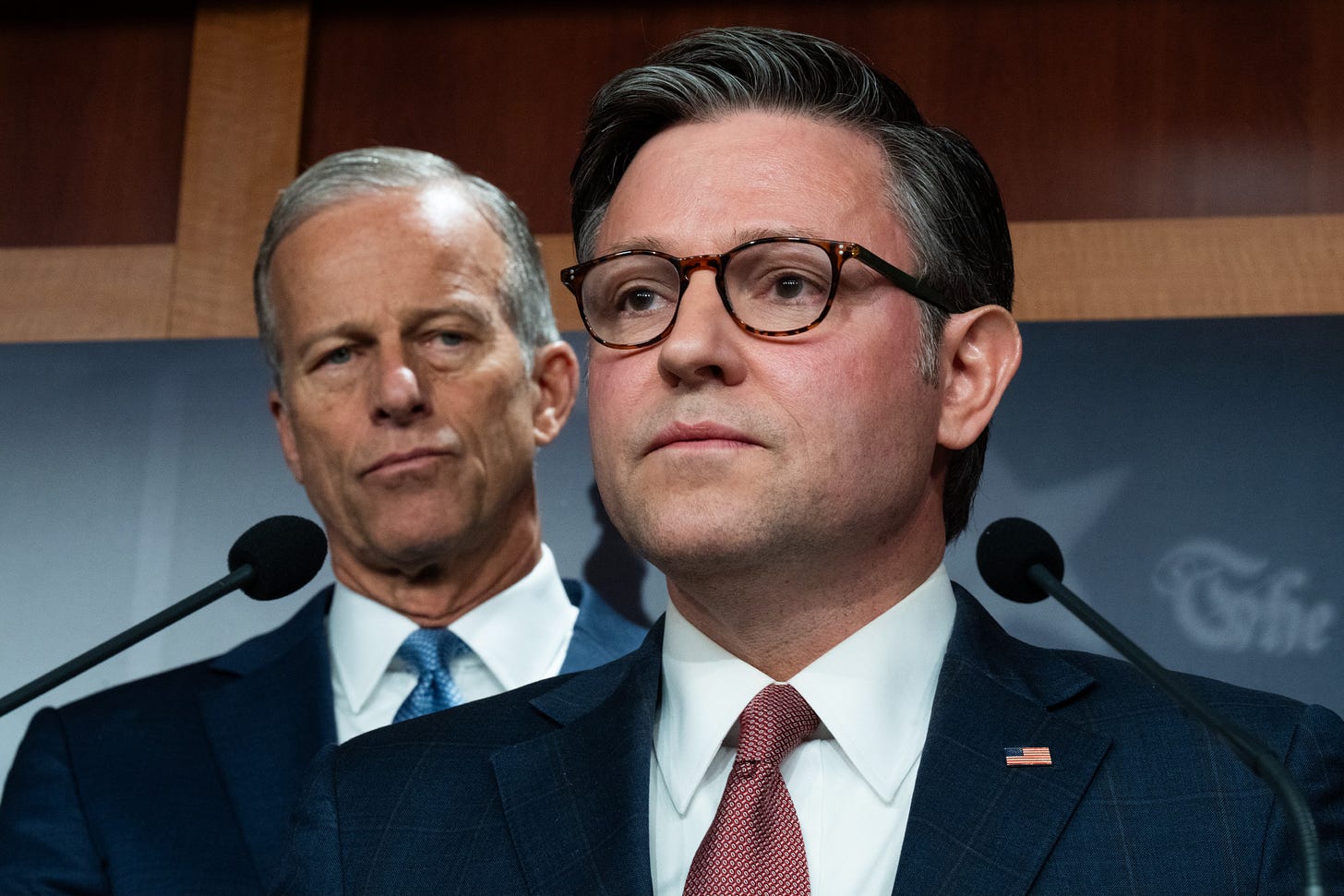Republicans are completely full of it on healthcare
And it becomes more obvious every time they talk about it.
Public Notice is supported by paid subscribers. Become one ⬇️
Against all odds, Democrats seemed to have gained the upper hand in the conflict over the government shutdown, in part by sticking relentlessly to their demand that enhanced subsidies for buying health insurance on the Affordable Care Act (aka Obamacare) exchanges be extended.
In response, Republicans are insisting — with increasing volume almost tipping into anger — that they very much care about Americans’ access to healthcare, all evidence to the contrary. Just witness the passion in Speaker of the House Mike Johnson’s voice as he explained last week that “Republicans are the ones concerned about healthcare. Republicans are the party working around the clock every day to fix healthcare.”
Johnson elaborated yesterday on Fox News Sunday, saying that “we have hundreds of ideas literally on the table to fix healthcare, to make it more affordable for the American people, to make access more available and to increase the quality of care.” Hundreds of ideas! That must be some table, where Republican members of Congress work late into the night poring over the arcane details of healthcare policy to flesh out their creative and complex ideas.
The cynical may say — and with good reason — that this is utter baloney. But there is another, even more disturbing possibility: What if Republicans really do care about healthcare, and really are going to do something about it at long last? This shutdown fight could be the beginning of something very, very bad.
Republicans have never really cared about healthcare
About a decade ago, when Barack Obama was still president, I had a friendly chat with a conservative think-tanker in the green room at C-SPAN about the ongoing battles over the Affordable Care Act. Though it was signed into law in 2010, Republicans never stopped saying they wanted to “repeal and replace” it, and they staged at least 70 symbolic votes to do so.
Nevertheless, I suggested to my counterpart, Republicans seemed to hate having to talk about healthcare at all. It just isn’t something that interests them, or that they care much about. They’re much more motivated by taxes, immigration, military policy — almost anything else. They certainly don’t like government health insurance programs and would be happy to see them cut or eliminated, but having to wade into the intricate healthcare policy weeds? Dullsville. They’d rather the issue just went away.
My new conservative friend admitted that my assessment was correct. But what could they do? Obama forced it on them.
A couple years later, when Donald Trump took office for his first term and Republicans controlled Congress, they had to put up or shut up. Having told their base for the prior seven years that they’d “repeal and replace” Obamacare at the first opportunity, they needed to follow through. The only problem was that they had forgotten all about the “replace” part. Obamacare itself was the result of decades of work from healthcare experts within the Democratic Party and a year-long public debate; the new GOP plan was slapped together in a matter of days and put up for a vote, with no hearings and little time for even their own members to understand it.
When John McCain gave his thumbs-down on the Senate floor, depriving Republicans of the last vote they needed for the repeal and replace plan, more than a few of them breathed a private sigh of relief. They understood that as much as they hated Obamacare, repealing it would be a cataclysmic reorganization of the healthcare system and a political disaster for them.
Yet they had to maintain the fiction that they were still working on the issue. For the next three and a half years, any time a reporter asked Trump about healthcare, he would say that his administration was about to release a fantastic plan, usually in two weeks’ time. The plan never came. And when he ran again in 2024, Trump once again forgot to come up with a healthcare plan; instead, he said in his debate with Kamala Harris, “I have concepts of a plan.”
Bad things are about to happen — and it’s only the beginning
Your average Republican member of Congress may not be immersed in the details of health policy, but they have a few basic principles they operate from.
The first is that when the government provides someone with health coverage, it’s an inherently bad thing. At the very least, it would be preferable if that person got their coverage from a private insurer. If the government is going to provide coverage, it should only be given to the “deserving.” In other words, there should be a virtue test for receiving coverage, with those who fail to pass getting their coverage taken away.
It’s that contempt for people who need coverage from the government that produced the insane Republican idea that millions of lazy Americans are saying to themselves, “Now that I’ve got this sweet Medicaid coverage, I don’t have to get a job,” as though you can pay for rent, food, transportation, and everything else a person needs with a Medicaid card. That then becomes the justification for slashing Medicaid which is what their Big Beautiful Bill did; analyses show it will result in somewhere between 10 and 15 million people losing their coverage.
That brings us to the shutdown, in which Democrats are insisting that their price for reopening the government is an extension of enhanced ACA exchange subsidies, which were put in place during the worst of the covid pandemic. They are slated to expire at the end of the year, which will produce some absolutely spectacular premium increases for millions of enrollees.
The average enrollee on the exchanges will see their premiums more than double; many will go from paying little or nothing to paying hundreds of dollars a month. When those increases hit, the pain will be enormous; 24 million people now get their coverage through the ACA marketplaces, twice as many as just four years ago. Incidentally, 3 in 4 of them are residents of states Trump won last year.
Most Americans probably don’t have a detailed grasp of what’s happening with subsidies right now, but once people start getting letters notifying them of how much their premiums are going up, it will become a much bigger issue. At the moment, according to the latest KFF tracking poll, 78 percent of Americans favor extending the subsidies — including 59 percent of Republicans. To try to win the support of Senate Democrats, Republicans have suggested they’d promise to hold a vote on extending the subsidies after the government reopens, which is very different from actually extending them.
As important as this immediate context is, we should also look past it to what Republicans might do next, however the shutdown is resolved.
There are certainly some in the GOP who would rather they could just stop worrying about healthcare. They don’t particularly care about whether people have coverage — or more properly, all the people they care about already have coverage, and they don’t much care if anyone else does. And as a political issue, it’s a loser for them.
But they still loathe the ACA, and seldom pass up an opportunity to say how horrible they think it is (“Obamacare is broken. Obamacare is a failure,” says Senate Majority Whip John Barrasso in a representative comment). Medicare is too politically insulated to touch, but they’d like to keep undermining Medicaid to kick as many people off as possible. If they could snap their fingers and eliminate the ACA marketplaces altogether, they would. And they haven’t arrived at a consensus on what the insurance system would look like in their preferred world, beyond a bunch of vacuous bromides about “choice” and “patient-centered care.”
But something is very different today than it was in 2010 or 2017. The first year of the Trump administration has blasted away all constraints on the GOP’s policy ambitions. After firing much of the federal workforce, creating an army of masked thugs to rampage through American cities, making new renewable energy projects practically illegal, and turning the Department of Justice into a Department of Revenge on Trump’s enemies, why not dismantle every bit of the Affordable Care Act?
If the answer is “Because that would be politically disastrous,” Republicans might respond that maybe it won’t be. After all, they’ve turbocharged their gerrymandering efforts to the point where it may be all but impossible for them to lose the House in 2026. And even if they are fated to lose the House, why not use the time between now and then to lay waste to everything their opponents value? Isn’t that what power is for?
When the premium increases come, they’ll blame it on Democrats: “See, we told you Obamacare is a disaster. Look what happened to your premiums! That’s why we need to get rid of it.” And keep in mind, Republicans will be able to pass another reconciliation bill — which requires only 51 votes in the Senate — next year, before the midterm elections. They might not bother to repeal the ACA once and for all next year. But don’t be surprised if they decide it’s the best and last chance they’ll have, and they can’t pass it up.
That’s it for today
We’ll be back with more tomorrow. If you appreciate today’s PN, please do your part to keep us free by signing up for a paid subscription.
Thanks for reading, and for your support.







This isn’t policymaking, it’s sabotage dressed as strategy.
From a behavioral lens, what we’re seeing is incentive inversion: weaponize dysfunction, then blame the fallout on the very systems you’ve undermined. The goal isn’t to fix healthcare. It’s to destabilize it just enough to justify repeal. And when gerrymandering insulates power from consequence, cruelty becomes costless.
As I’ve written also in Cruelty as Strategic Export, the erosion of public goods isn’t accidental, it’s engineered. The louder the denial, the clearer the intent.
Thanks for keeping this going strong.
— Johan
Professor of Behavioral Economics and Applied Cognitive Theory
Former Foreign Service Officer
It’s a well written and persuasive overview but I’d disagree with one claim: that Medicare will be untouched. There have already been attempts to impose obstacles to accessing traditional Medicare coverage (not the privatized Medicare Advantage ).